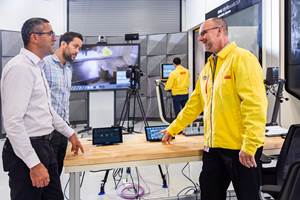Skills Center: Apprentice Training—Work Rules
These work rules clear up any confusion about what it really takes to be successful in the trades for new employees.
Earlier this year this column discussed teaching work ethic and attitude to new people in the trades, and then we covered the importance of setting expectations. Both articles received very positive feedback and requests for more information on the topics. I therefore have decided to showcase here a list of the work rules that we share with each person who we have helped begin a career in the trades. These are straight-forward rules that can help any new employee understand how to build a successful career.
We begin with a note of congratulations to the new hire on landing his or her new position, and then we remind him or her that not only are they building a career, they are also representing the people who have helped them along the way. This is followed up with a presentation of the rules to which they must adhere every day on the job:
- Follow all safety rules.
- Show up early enough to work, so that you can get your work assignment and begin working at the start of your shift. No “warm up” time.
- For break times, be the last person to go on break and the first person to go back to work. Or, if possible, skip the short breaks and only take lunch. This helps to make a positive first impression when starting a new job.
- Be the last person to stop working at the end of your shift. No “cool down” time.
- If you can find a way to multi-task, do it!
- Never complain about a job assignment.
- Never speak poorly of the company.
- Never speak poorly of coworkers.
- Never speak poorly of your boss or your management.
- Never engage with other employees in negative conversation about the company or other people.
- Approach all problems with a positive attitude.
- If an experienced worker has something to tell you, shut up and listen.
- If an experienced worker has something to show you, shut up and watch.
- If an experienced worker wants to tell or show you something that you think you already know, shut up, watch and listen anyway.
- Always be willing to learn. Always.
- If you don’t understand what is being asked of you, then ask questions.
- Do not say that you understand and then demonstrate through your actions that you do not understand.
- Be the first person to offer help when someone needs it.
- Take initiative! Don’t wait to be told what to do.
- If you don’t know what to do and your boss is too busy to give you another task, pick up a broom or mop and start cleaning.
- Never stand around waiting for someone to tell you what to do next.
- Stay on task.
- Do not engage in unnecessary talking.
- Stay focused, and do your job.
- Set goals.
- Keep track of how long it takes you to do a task, and then do it faster the next time.
- Try to surprise your boss with the speed and quality of your work.
- Approach every person with professionalism.
- Never, ever blame other people for anything.
- Be a personally accountable employee.
- Be grateful for your job, and thank the people who help you.
- Take notes if you are being taught something complex.
- Avoid asking the same questions twice.
- Keep an attitude of humility.
- There are no jobs that you are “too good to do.”
- Take pride in being part of a skilled trade.
- Follow Mike Rowe’s advice: Work smarter and harder.
- Set long term goals for your career.\
- Be willing to work through the difficult days to achieve your goals.
- Recognize and be grateful for this work opportunity.
- You are starting out in a skilled trade that can provide for you personally and professionally for the rest of your life. There are no limits to what you can accomplish. If you work hard and follow these rules, you will be rewarded.
The goal of presenting these work rules to new employees (or even family and friends) is to clear up any confusion about what it really takes to be successful in the trades. Clearly, there is no secret formula. The key to success is just good old-fashioned hard work. It takes discipline and commitment.
Related Content
Confronting the Mold Design Talent Drought
Recently, I reposted on LinkedIn the results of an informal survey we conducted, which revealed a shortage of skilled mold designers. It quickly gained a lot of traction. Given the response, I thought I'd summarize the feedback and keep the conversation going.
Read MoreThe Role of Social Media in Manufacturing
Charles Daniels CFO of Wepco Plastics shares insights on the role of social media in manufacturing, how to improve the “business” side of a small mold shop and continually developing culture.
Read MoreHow to Use Continuing Education to Remain Competitive in Moldmaking
Continued training helps moldmakers make tooling decisions and properly use the latest cutting tool to efficiently machine high-quality molds.
Read MoreLeading Mold Manufacturers Share Best Practices for Improving Efficiency
Precise Tooling Solutions, X-Cell Tool and Mold, M&M Tool and Mold, Ameritech Die & Mold, and Cavalier Tool & Manufacturing, sit down for a fast-paced Q&A focused on strategies for improving efficiencies across their operations.
Read MoreRead Next
How to Use Strategic Planning Tools, Data to Manage the Human Side of Business
Q&A with Marion Wells, MMT EAB member and founder of Human Asset Management.
Read MoreHow to Use Continuing Education to Remain Competitive in Moldmaking
Continued training helps moldmakers make tooling decisions and properly use the latest cutting tool to efficiently machine high-quality molds.
Read MoreReasons to Use Fiber Lasers for Mold Cleaning
Fiber lasers offer a simplicity, speed, control and portability, minimizing mold cleaning risks.
Read More






















